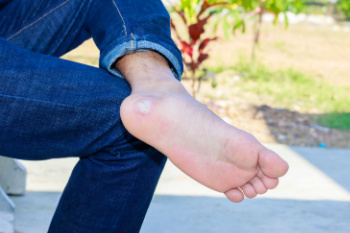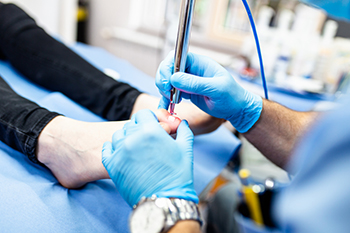Connect With Us
Blog
Items filtered by date: September 2024
Bunion Surgery Procedures

Bunion surgery is designed to alleviate pain and correct the misalignment caused by bunions. The procedure may involve several techniques depending on the severity and specific characteristics of the bunion. Exostectomy is the removal of the bony bump, while osteotomy realigns the bones of the toe to correct its position. Arthrodesis, or fusion surgery, involves joining two bones in the toe to stabilize the joint and reduce pain. Resection arthroplasty removes the damaged joint and reshapes the bones to improve function. Post-surgery, you can expect a recovery period involving rest, wearing special footwear, and gradual rehabilitation exercises. If you have a bunion that is causing discomfort, it is suggested that you consult a podiatrist who can determine if surgery is right for you.
Foot surgery is sometimes necessary to treat a foot ailment. To learn more, contact Mark Isenberg, DPM of Center for Podiatric Excellence. Our doctor will assist you with all of your foot and ankle needs.
When Is Surgery Necessary?
Foot and ankle surgery is generally reserved for cases in which less invasive, conservative procedures have failed to alleviate the problem. Some of the cases in which surgery may be necessary include:
- Removing foot deformities like bunions and bone spurs
- Severe arthritis that has caused bone issues
- Cosmetic reconstruction
What Types of Surgery Are There?
The type of surgery you receive will depend on the nature of the problem you have. Some of the possible surgeries include:
- Bunionectomy for painful bunions
- Surgical fusion for realignment of bones
- Neuropathy decompression surgery to treat nerve damage
Benefits of Surgery
Although surgery is usually a last resort, it can provide more complete pain relief compared to non-surgical methods and may allow you to finally resume full activity.
Surgical techniques have also become increasingly sophisticated. Techniques like endoscopic surgery allow for smaller incisions and faster recovery times.
If you have any questions please feel free to contact our office located in Pensacola, FL . We offer the newest diagnostic and treatment technologies for all your foot and ankle needs.
Let the Expert Treat Your Ingrown Toenails
Plantar Fasciitis Relief

Plantar fasciitis is a common foot condition that causes pain in the heel and the bottom of the foot. It occurs when the plantar fascia, a thick band of tissue that runs along the bottom of your foot and connects the heel bone to the toes, becomes inflamed. This inflammation is often due to overuse, excessive pressure, or improper footwear. People with plantar fasciitis typically experience sharp, stabbing pain, especially in the morning or after long periods of rest. To manage plantar fasciitis, it is important to rest and avoid activities that can worsen the pain. Wearing supportive shoes can help to reduce strain. In more severe cases, corticosteroid injections, or even surgery may be necessary to achieve relief. If you have plantar fasciitis, it is strongly suggested that you schedule an appointment with a podiatrist for treatment.
Plantar fasciitis can be very painful and inconvenient. If you are experiencing heel pain or symptoms of plantar fasciitis, contact Mark Isenberg, DPM from Center for Podiatric Excellence. Our doctor can provide the care you need to keep you pain-free and on your feet.
What Is Plantar Fasciitis?
Plantar fasciitis is the inflammation of the thick band of tissue that runs along the bottom of your foot, known as the plantar fascia, and causes mild to severe heel pain.
What Causes Plantar Fasciitis?
- Excessive running
- Non-supportive shoes
- Overpronation
- Repeated stretching and tearing of the plantar fascia
How Can It Be Treated?
- Conservative measures – anti-inflammatories, ice packs, stretching exercises, physical therapy, orthotic devices
- Shockwave therapy – sound waves are sent to the affected area to facilitate healing and are usually used for chronic cases of plantar fasciitis
- Surgery – usually only used as a last resort when all else fails. The plantar fascia can be surgically detached from the heel
While very treatable, plantar fasciitis is definitely not something that should be ignored. Especially in severe cases, speaking to your doctor right away is highly recommended to avoid complications and severe heel pain. Your podiatrist can work with you to provide the appropriate treatment options tailored to your condition.
If you have any questions please feel free to contact our office located in Pensacola, FL . We offer the newest diagnostic and treatment technologies for all your foot and ankle needs.
Plantar Warts in Children

Plantar warts are a common foot issue in children, caused by the human papillomavirus, abbreviated HPV. These warts typically appear on the soles of the feet and can be painful, especially when walking or standing. Children are more susceptible to plantar warts due to their active lifestyles and frequent exposure to public areas like swimming pools, locker rooms, and playgrounds, where the virus thrives in warm, moist environments. Plantar warts often look like small, rough growths with tiny black dots at the center. While they may go away on their own, treatment can speed up the healing process and relieve discomfort. Options can include, cryotherapy, freezing, or removal by a podiatrist. To prevent plantar warts, encourage kids to wear flip-flops in public areas and keep their feet clean and dry. If your child has a plantar wart, it is suggested that you visit a podiatrist for appropriate treatment.
Plantar warts can be very uncomfortable. If you need your feet checked, contact Mark Isenberg, DPM from Center for Podiatric Excellence. Our doctor will assist you with all of your foot and ankle needs.
About Plantar Warts
Plantar warts are the result of HPV, or human papillomavirus, getting into open wounds on the feet. They are mostly found on the heels or balls of the feet.
While plantar warts are generally harmless, those experiencing excessive pain or those suffering from diabetes or a compromised immune system require immediate medical care. Plantar warts are easily diagnosed, usually through scraping off a bit of rough skin or by getting a biopsy.
Symptoms
- Lesions on the bottom of your feet, usually rough and grainy
- Hard or thick callused spots
- Wart seeds, which are small clotted blood vessels that look like little black spots
- Pain, discomfort, or tenderness of your feet when walking or standing
Treatment
- Freezing
- Electric tool removal
- Laser Treatment
- Topical Creams (prescription only)
- Over-the-counter medications
To help prevent developing plantar warts, avoid walking barefoot over abrasive surfaces that can cause cuts or wounds for HPV to get into. Avoiding direct contact with other warts, as well as not picking or rubbing existing warts, can help prevent the further spread of plantar warts. However, if you think you have developed plantar warts, speak to your podiatrist. He or she can diagnose the warts on your feet and recommend the appropriate treatment options.
If you have any questions please feel free to contact our office located in Pensacola, FL . We offer the newest diagnostic and treatment technologies for all your foot and ankle needs.
Explaining Laser Treatment for Fungal Toenails

Laser treatment for fungal toenails is a modern approach that targets the infection with concentrated light, effectively reducing or eliminating the fungus. This procedure is particularly beneficial for individuals who may not tolerate oral antifungal medications, such as those with liver or kidney issues, diabetes, or older adults. During the procedure, a podiatrist uses a specialized device to shine light onto the affected nails, which may destroy or inhibit the growth of the fungus. This non-invasive treatment typically causes minimal discomfort, with most patients able to resume their regular activities immediately. Results of laser toenail treatment are not immediate and may take a couple of months to become noticeable, with full nail regrowth taking longer. Multiple sessions might be necessary to achieve the desired outcome. If you have fungal toenail problems, it is suggested that you schedule an appointment with a podiatrist to see if laser treatment is right for you.
Laser treatment can be an effective way to get rid of toenail fungus. If you have any questions about laser treatment, consult with Mark Isenberg, DPM from Center for Podiatric Excellence. Our doctor will assess your condition and provide you with quality treatment for fungal nails.
What Are Toenail Fungal Infections?
Onychomycosis, or fungal infection of the nail, is a relatively common and non-serious condition. Around 10 percent of U.S. citizens are afflicted with fungal nails. Common forms of fungus that infect the nail include dermatophytes, yeasts, and molds.
Symptoms of Toenail Fungal Infections Include:
- Nail thickening
- Brittleness of the nail
- Discoloration of the nail
Diagnosis for Fungal Nails
Fungal infections are diagnosed by fungal culture and microscopy. This will rule out any other conditions such as nail trauma, psoriasis, lichen planus, and onychogryphosis.
What Is Laser Treatment?
Laser treatment is a non-invasive, safe, quick, and painless procedure that uses the heat from a laser to kill fungus in the nail. Each infected nail is targeted with a laser for several minutes. The treatment is usually utilized several different times over a select period. During this time, a podiatrist will keep an eye on the infection.
If you have any questions, please feel free to contact our office located in Pensacola, FL . We offer the newest diagnostic and treatment technologies for all your foot care needs.
Blog Archives
- March 2025
- February 2025
- January 2025
- December 2024
- November 2024
- October 2024
- September 2024
- August 2024
- July 2024
- June 2024
- May 2024
- April 2024
- March 2024
- February 2024
- January 2024
- December 2023
- November 2023
- October 2023
- September 2023
- August 2023
- July 2023
- June 2023
- May 2023
- April 2023
- March 2023
- February 2023
- January 2023
- December 2022
- November 2022
- October 2022
- September 2022
- August 2022
- July 2022
- June 2022
- May 2022
- April 2022
- March 2022
- February 2022
- January 2022
- December 2021
- November 2021
- October 2021
- September 2021
- August 2021
- July 2021
- June 2021
- May 2021
- April 2021
- March 2021
- February 2021

